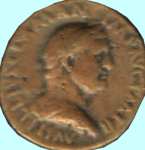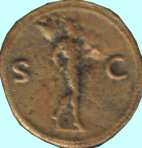|
Roma, 15.6.2005
Egregio
Lettore,
di seguito
trascrivo i dati significativi pertinenti alla sua
moneta:
Sesterzio1, zecca di Roma, aprile-dicembre 69 d. C.2, C
I 78, indice
di rarità "R".
D. A
VITELLIVS GERMAN IMP AVG P M TR3 (sic!). Busto laureato a destra di
Vitellio, drappeggiato.
R. S C
grandi a sinistra e a destra nel campo. Marte
elmato, nudo eccetto che per un mantello che
ondeggia attorno alla vita, in movimento verso
destra, asta trasversale con la punta in alto nella
mano destra, trofeo sulla spalla sinistra.
,
La ricerca
nel web di monete di pari tipologia ha prodotto i
seguenti risultati:
- http://www.edgarlowen.com/C060.html A Choice Sestertius of the
Roman Emperor Vitellius, AD 69 In the chaos
following Nero's suicide, several men including
Aulus Vitellius, Governor of Lower Germany,
briefly contended for power. Proclaimed Augustus
by the German legions, he marched on Rome
pillaging the countryside as he went. For a few
short months he reigned in Rome where his gluttony
was legendary. Soon however Vespasian, the
Governor of Judaea, who had also been proclaimed
Augustus, approached with his legions to the
outskirts of Rome. Faced with an overwhelming
force, Vitellius offered to abdicate, but the
Romans, appalled at his weakness, refused to
accept his abdication. The terrified Vitellius
retired to his Palace where several days later he
was dragged out, tortured and murdered and his
body cast into the Tiber. All coins of Vitellius
are quite scarce to rare due to his short time as
emperor. The current example has one of the finest
portraits, the folds of his neck clearly betraying
his gluttony. It is said that in his ill fated
attempt to flee Rome he had tried only to take his
pastry chef with him. Obverse: Finely engraved
bust of Vitellius wearing a laurel wreath; Latin
legend A VITELLIVS GERMAN IMP AVG PM TR P,
abbreviated form of Aulus Vitellius Germanicus
Imperator Avgustus Pontifex Maximus Tribunicia
Potestas = 'Aulus Vitellius, victor over the
Germans, Emperor, Augustus, Head of the State
Religion, with Tribunal Powers'. Reverse: The God
Mars, naked but for a crested helmet, walking
right carrying a spear and a legionary standard;
Latin letters S C, abbreviation for Senatus
Consultuo = 'Issued with the consent of The
Senate'. Mean diameter: 36 mm. (1.42"). Weight:
25.02 gm. (0.985 Troy oz.). Metal composition:
Bronze. References: ??? Grade: Almost Extra Fine.
Price US$3,500. Status: Available. Order #C060.
Concludo
osservando che le caratteristiche fisiche della moneta
di figura sono compatibili con i conî d'epoca. Quanto
alla stile non mi pronuncio perché l'immagine non è
sufficientemente dettagliata, sicché non mi riesce di
distinguere alcuni particolari importanti, come la
presenza dell'asta trasversale nella mano destra di
Marte, né lo svolazzo del mantello in prossimità della
vita, né, sul dritto, la corona d'alloro in capo al
sovrano. D'altra parte ricordo che di questa moneta mi
sono occupato in passato in un paio di altre
circostanze (cliccare qui
e qui),
in entrambi le quali le immagini, poco definite,
appartenevano alla variante anomala C/I 78, (v. nota(3)), proprio come la
moneta di figura. La coincidenza mi appare assai
singolare, tanto da ritenere plausibile che questa
moneta, come le altre due già esaminate, siano state
battute dalla stessa officina in tempi moderni.
Un saluto
cordiale.
Giulio De
Florio
www.monetaromana.it
---------
Note:
(1) Di seguito riporto le caratteristiche
fisiche di 3 sesterzi di tipologia molto simile a
quella di figura censiti da BMC:
| BMC |
Peso (g.) |
Diametro (mm) |
Asse di conio (ore) |
| 58 |
27,11 |
36,83 |
6 |
| 59 |
29,03 |
36,83 |
6 |
| 60 |
24,53 |
35,56 |
6 |
Il peso del
sesterzio durante il regno di Vitellio è indicato da
BMC come 26,17 g (media su 21 esemplari battuti
dalla zecca di Roma).
(2) Per le note biografiche sul
breve regno di Vitellio rimando al sito: http://www.tesorillo.com/altoimperio/vitelio/1vitelio.htm,
oppure alle note a corredo del
link n° 1.
(3) Aulus VITELLIVS GERMANicus IMPerator
AVGustus Pontifex Maximus TRibunicia (Potestas,
omesso). Si tratta dunque di una variante anomala,
attestata solo dal Cohen. La moneta normale,
classificata RIC
I 141, BMC
I 58, C
I 79, termina invece correttamente con le
lettere TR P (TRibunicia Potestas). Della
variante C/I 78 esiste, secondo il Cohen, anche un
riconio del Paduan, noto incisore vissuto in era
moderna, tra il 1500 e il 1570.
|

